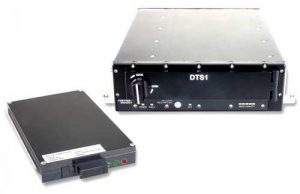Curtiss-Wright Doubles Storage Capacity of NSA CSfC Components List Approved DTS1 Storage Device at Up to 8TB SSD
COTS data-at-rest storage solution with 2 layers of full disk encryption in single device
This is a Press Release edited by StorageNewsletter.com on September 30, 2020 at 2:20 pmCurtiss-Wright’s Defense Solutions division doubled the maximum storage capacity of the Removable Memory Cartridge (RMC) used in its Data Transport System (DTS1) NAS device from 4TB to 8TB.
With the increased storage , NSA Commercial Solutions for Classified (CSfC) Components List approved DTS1 can support far longer missions for storing classified data on manned and unmanned vehicles.
The DTS1, an embedded industry’s commercial off-the-shelf (COTS) data-at-rest (DAR) storage solution to support 2 layers of full disk encryption (FDE) in a single device, is the only Common Criteria-certified NAS solution approved by the NSA and approved by NATO with two certified encryption layers. The company recently announced the addition of support for a MIL-STD-1275 compliant filter on the DTS1 to mitigate vs. high voltage spikes, long voltage surges, and ripples that can reduce performance and reliability. Compliance with MIL-STD-1275 ensures system integrators that in addition to airborne applications, the DTS1 can also be dependably deployed in land vehicle applications.
“Curtiss-Wright is committed to leading the industry in designing advanced rugged storage solutions for deployed aerospace and defense applications,” said Lynn Bamford, president, defense and power. “We continually improve and enhance the functionality of our unmatched data-at-rest products. Doubling the storage capacity of our popular DTS1 enables its use in longer duration missions, enabling the secure collection of far greater amounts of classified data.“
About RMC storage cartridge
The RMC is a DAS device designed for rugged, deployed applications. Small enough to fit a shirt or flight suit pocket, the RMC is for data transport. With its 100,000 insertion cycle connector, the RMC was designed to withstand years of insertion and removal for storage and transport. Based on 2.5″ SATA SSD, the RMC is scalable from 256GB to 8TB today, but can adapt to new SSDs in the future. The cartridge’s MIL QPL connector is non-proprietary, with mating connectors readily available.
The RMC’s 2.5″ SATA drive can support a variety of SSD types and capacities. For large storage applications, MLC NAND flash SSDs can provide up to 8TB in a single RMC. Alternatively, an empty RMC can be purchased with an SSD of the customer’s choice. This could include SSDs certified to encryption standards required to meet a program’s specific requirements. For lab or other benign applications, cost-effective MLC NAND flash SSDs can be used.
About DTS1 two layer encryption approach
The DTS1 incorporates 2 distinct layers of AES 256-bit encryption into one device, making protection of ‘Top Secret’ data more cost effective and low risk than traditional NSA Type 1 device development. Both the hardware and software FDE layers have been individually certified vs. two Common Criteria protection profiles: (1) collaborative Protection Profile for Full Disk Encryption Encryption Engine; (2) collaborative Protection Profile for Full Disk Encryption Authorization Acquisition.
About DTS1
The small DTS1 NAS device, which weighs 3.77lb. (1.71kg) and measures 1.5×5.0x6.5″ (38.1x127x165.1mm), delivers up to 8TB of SSD with two layers of certified encryption. It supports PXE protocol so that network clients on a vehicle or aircraft can quickly boot from the encrypted files on the DTS1’s removable memory cartridge (RMC). This approach both facilitates software updates for network clients and reduces SWaP by eliminating the need for individual HDDs in each network client. The company offers 2 layers of encryption in 2 mounting options of the DTS1, the VS-DTS1SL-FD, which is designed for cockpit use with DZUS mounting panel, and the VS-DTS1SL-F, which uses L-brackets to support flexible mounting within space-constrained platforms.
The DTS1 enables network-enabled device to retrieve stored data or save new captured data. Networked devices using heterogeneous OSs (Linux, VxWorks, Windows, etc.) that support NAS protocols (i.e., NFS, CIFS, FTP, or HTTP) can store data on and retrieve data from the DTS1. It also supports iSCSI protocol for block storage and PCAP protocol for Ethernet packet capture.
Common criteria advantage
The DTS1 has been evaluated vs. a common set of international standards, enabling system designers in Common Criteria Recognition Agreement (CCRA) member countries in Europe, Middle East, North America, and Asia, and the 29 NATO states, to confidently, without requiring further evaluation, select the device to reduce the development time of their deployed encryption solution. The rugged small form-factor DTS1 NAS device is designed to store and protect large amounts of data on helicopters, fighters, unmanned aerial vehicles (UAV), unmanned underwater vehicles (UUV), unmanned ground vehicles (UGV), and intelligence surveillance reconnaissance (ISR) aircraft that require the protection of sensitive DAR to international standards.
Complete embedded system solutions
The DTS1 is designed for rugged applications that require the storage, removal, and transport of critical data such as cockpit data (mission, map, maintenance), ISR (camera, I&Q, sensors), mobile applications (ground radar, ground mobile, airborne ISR pods), heavy industrial (steel, refinery), and video/audio data collection (flight test instrumentation). The device can be quickly integrated into a rugged deployed system based on the company’s range of open architecture single board computers and DSP modules, as well as integrated mission computers, sensor management systems, and network switches.
Read also:
Curtiss-Wright NSA Approved Common Criteria Certified DTS1 NAS
Qualified for operating temperature from -45ºC to +85ºC
April 17, 2020 | Press Release
Curtiss-Wright Encryption-Ready Rugged DTS1 COTS, and Data-at-Rest Embedded NAS
With Common Criteria Certified NAS to support MIL-STD-1275, provides power supply spike and surge protection on ground vehicles.
October 24, 2019 | Press Release














 Subscribe to our free daily newsletter
Subscribe to our free daily newsletter

